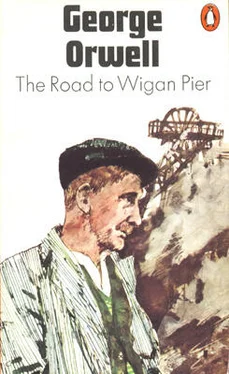George Orwell - The Road to Wigan Pier
Здесь есть возможность читать онлайн «George Orwell - The Road to Wigan Pier» весь текст электронной книги совершенно бесплатно (целиком полную версию без сокращений). В некоторых случаях можно слушать аудио, скачать через торрент в формате fb2 и присутствует краткое содержание. Жанр: Классическая проза, на английском языке. Описание произведения, (предисловие) а так же отзывы посетителей доступны на портале библиотеки ЛибКат.
- Название:The Road to Wigan Pier
- Автор:
- Жанр:
- Год:неизвестен
- ISBN:нет данных
- Рейтинг книги:5 / 5. Голосов: 1
-
Избранное:Добавить в избранное
- Отзывы:
-
Ваша оценка:
- 100
- 1
- 2
- 3
- 4
- 5
The Road to Wigan Pier: краткое содержание, описание и аннотация
Предлагаем к чтению аннотацию, описание, краткое содержание или предисловие (зависит от того, что написал сам автор книги «The Road to Wigan Pier»). Если вы не нашли необходимую информацию о книге — напишите в комментариях, мы постараемся отыскать её.
Эссе Оруэлла всегда умные, изысканно-злые и в чем-то парадоксальные.
Сейчас, как и в прошлом, многим они кажутся спорными и «скандальными». Почему? Да потому, что Джордж Оруэлл всегда современен!
The Road to Wigan Pier — читать онлайн бесплатно полную книгу (весь текст) целиком
Ниже представлен текст книги, разбитый по страницам. Система сохранения места последней прочитанной страницы, позволяет с удобством читать онлайн бесплатно книгу «The Road to Wigan Pier», без необходимости каждый раз заново искать на чём Вы остановились. Поставьте закладку, и сможете в любой момент перейти на страницу, на которой закончили чтение.
Интервал:
Закладка:
And this raises a great difficulty. It means that the issue of class, as distinct from mere economic status, has got to be faced more realistically than it is being faced at present.
I devoted three chapters to discussing the class-difficulty. The principal fact that will have emerged, I think, is that though the English class-system has outlived its usefulness, it has outlived it and shows no signs of dying. It greatly confuses the issue to assume, as the orthodox Marxist so often does (see for instance Mr Alee Brown's in some ways interesting book. The Fate of the Middle Classes ), that social status is determined solely by income. Economically, no doubt, there are only two classes, the rich and the poor, but socially there is a whole hierarchy of classes, and the manners and traditions learned by each class in childhood are not only very different but — this is the essential point generally persist from birth to death. ‘Hence the anomalous individuals that you find in every class of society. You find writers like Wells and Bennett who have grown immensely rich and have yet preserved intact their lower-middle-class Nonconformist prejudices; you find millionaires who cannot pronounce their aitches; you find petty shopkeepers whose income is far lower than that of the bricklayer and who, nevertheless, consider themselves (and are considered) the bricklayer's social superiors; you find board-school boys ruling Indian provinces and public-school men touting vacuum cleaners. If social stratification corresponded precisely to economic stratification, the public-school man would assume a cockney accent the day his income dropped below £200 a year. But does he? On the contrary, he immediately becomes twenty times more Public School than before. He clings to the Old School Tie as to a life-line. And even the aitchless millionaire, though sometimes he goes to an elocutionist and leams a B.B.C. accent, seldom succeeds in disguising himself as completely as he would like to. It is in fact very difficult to escape, culturally, from the class into which you have been born.
As prosperity declines, social anomalies grow commoner. You don't get more aitchless millionaires, but you do get more and more public-school men touting vacuum cleaners and more and more small shopkeepers driven into the workhouse. Large sections of the middle class are being gradually proletarianized; but the important point is that they do not, at any rate in the first generation, adopt a proletarian outlook. Here am I, for instance, with a bourgeois upbringing and a working-class income. Which class do I belong to? Economically I belong to the working class, but it is almost impossible for me to think of myself as anything but a member of the bourgeoisie. And supposing I had to take sides, whom should I side with, the upper class which is trying to squeeze me out of existence, or the working class whose manners are not my manners? It is probable that I personally, in any important issue, would side with the working class. But what about the tens or hundreds of thousands of others who are in approximately the same position? And what about that far larger class, running into millions this time — the office-workers and black-coated employees of all kinds — whose traditions are less definitely middle class but who would certainly not thank you if you called them proletarians? All of these people have the same interests and the same enemies as the working class. All are being robbed and bullied by the same system. Yet how many of them realize it? When the pinch came nearly all of them would side with their oppressors and against those who ought to be their allies. It is quite easy to imagine a middle class crushed down to the worst depths of poverty and still remaining bitterly anti-working-class in sentiment; this being, of course, a ready-made Fascist Party.
Obviously the Socialist movement has got to capture the exploited middle class before it is too late; above all it must capture the office-workers, who are so numerous and, if they knew how to combine, so powerful. Equally obviously it has so far failed to do so. The very last person in whom you can hope to find revolutionary opinions is a clerk or a commercial traveller. Why? Very largely, I think, because of the ‘proletarian’ cant with which Socialist propaganda is mixed up. In order to symbolize the class war, there has been set up the more or less mythical figure of a ‘proletarian’, a muscular but downtrodden man in greasy overalls, in contradistinction to a ‘capitalist’, a fat, wicked man in a top hat and fur coat. It is tacitly assumed that there is no one in between; the truth being, of course, that in a country like England about a quarter of the population is in between. If you are going to harp on the ‘dictatorship of the proletariat’, it is an elementary precaution to start by explaining who the proletariat are . But because of the Socialist tendency to idealize the manual worker as such, this has never been made sufficiently clear. How many of the wretched shivering army of clerks and shopwalkers, who in some ways are actually worse off than a miner or a dock-hand, think of themselves as proletarians? A proletarian — so they have been taught to think — means a man without a collar. So that when you try to move them by talking about ‘class war’, you only succeed in scaring them; they forget their incomes and remember their accents, and fly to the defence of the class that is exploiting them.
Socialists have a big job ahead of them here. They have got to demonstrate, beyond possibility of doubt, just where the line of cleavage between exploiter and exploited comes. Once again it is a question of sticking to essentials; and the essential point here is that all people with small, insecure incomes are in the same boat and ought to be fighting on the same side. Probably we could do with a little less talk about’ capitalist’ and ‘proletarian’ and a little more about the robbers and the robbed. But at any rate we must drop that misleading habit of pretending that the only proletarians are manual labourers. It has got to be brought home to the clerk, the engineer, the commercial traveller, the middle-class man who has ‘come down in the world’, the village grocer, the lower-grade civil servant, and all other doubtful cases that they are the proletariat, and that Socialism means a fair deal for them as well as for the navvy and the factory-hand. They must not be allowed to think that the battle is between those who pronounce their aitches and those who don't; for if they think that, they will join in on the side of the aitches.
I am implying that different classes must be persuaded to act together without, for the moment, being asked to drop their class-differences. And that sounds dangerous. It sounds rather too like the Duke of York's summer camp and that dismal line of talk about class-cooperation and putting our shoulders to the wheel, which is eyewash or Fascism, or both. There can be no cooperation between classes whose real interests are opposed. The capitalist cannot cooperate with the proletarian. The cat cannot cooperate with the mouse; and if the cat does suggest cooperation and the mouse is fool enough to agree, in a very little while the mouse will be disappearing down the cat's throat. But it is always possible to cooperate so long as it is upon a basis of common interests. The people who have got to act together are all those who cringe to the boss and all those who shudder when they think of the rent. This means that the small-holder has got to ally himself with the factory-hand, the typist with the coal-miner, the schoolmaster with the garage mechanic. There is some hope of getting them to do so if they can be made to understand where their interest lies. But this will not happen if their social prejudices, which in some of them are at least as strong as any economic consideration, arc needlessly irritated. There is, after all, a real difference of manners and traditions between a bank clerk and a dock labourer, and the bank clerk's feeling of superiority is very deeply rooted. Later on he will have to get rid of it, but this is not a good moment for asking him to do so. Therefore it would be a very great advantage if that rather meaningless and mechanical bourgeois-baiting, which is a part of nearly all Socialist propaganda, could be dropped for the time being. Throughout left-wing thought and writing — and the whole way through it, from the leading articles in the Daily Worker to the comic columns in the News Chronicle — there runs an anti-genteel tradition, a persistent and often very stupid gibing at genteel mannerisms and genteel loyalties (or, in Communist jargon, ‘bourgeois values’). It is largely hum-bug, coming as it does from bourgeois-baiters who are bourgeois themselves, but it does great harm, because it allows a minor issue to block a major one. It directs attention away from the central fact that poverty is poverty, whether the tool you work with is a pick-axe or a fountain-pen.
Читать дальшеИнтервал:
Закладка:
Похожие книги на «The Road to Wigan Pier»
Представляем Вашему вниманию похожие книги на «The Road to Wigan Pier» списком для выбора. Мы отобрали схожую по названию и смыслу литературу в надежде предоставить читателям больше вариантов отыскать новые, интересные, ещё непрочитанные произведения.
Обсуждение, отзывы о книге «The Road to Wigan Pier» и просто собственные мнения читателей. Оставьте ваши комментарии, напишите, что Вы думаете о произведении, его смысле или главных героях. Укажите что конкретно понравилось, а что нет, и почему Вы так считаете.












